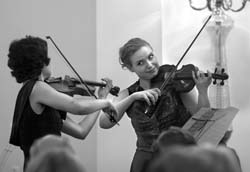In Schnitke’s Key
The Russian Embassy hosts a soiree dedicated to a legendary composer of our time
Musical Thursdays have become a fine tradition. Once a month Russia’s ambassador Viktor Chernomyrdin invites the political, academic, artistic, and business elite, as well as his counterparts accredited in Ukraine, to his residence. The latest soiree featured an interesting program organized by Liudmyla Tsvirko, professor of the Peter Tchaikovsky National Music Academy of Ukraine. Graduate students of this leading art institution-pianist Olha Suvorova, violinists Sophia Suldina and Vilena Zholdakova, and cellist Olha Zayats-performed the works of Alfred Schnitke, namely, An Old-Style Sonata, Sonata No. 1 for Violoncello and Piano, and Moz-Art for two violins. All the listeners found in Schnitke’s music something that struck a chord with them, for this composer’s works are very consonant with the rhythms of our time. When Alfred Schnitke was alive, critics called him a “modern classic and a genius.” Having departed this life at 64, he left us, his contemporaries, a rich heritage of more than seventy oeuvres, such as symphonies; chamber, vocal and instrumental pieces; and musical scores for theatrical productions and movies.
“I am a Schnitke aficionado,” admitted Germany’s ambassador to Ukraine Dietmar Stuedemann. “I always go with pleasure to concerts that feature performances of his works. I had the privilege of knowing the composer in person: we met in Moscow in the late 1970s. My wife and I managed to attend the farewell recital of Arvo Part (on the eve of his departure from the former USSR), at the Great Hall of Moscow’s Peter Tchaikovsky Conservatory. Present at the soiree were many illustrious musicians who came to say goodbye to their colleague. Incidentally, Schnitke’s wife Margarita also performed there-she played his famous Piano Concerto. That was fantastic!
“I was always in raptures over this composer’s talent. I respected Schnitke for his courage, for he suffered very much in his lifetime. Alfred never concealed his German and Jewish roots. He was proud of them, although this was considered a downside and blot on his biography at the time. In Germany, Schnitke not only underwent medical treatment but also taught at Hamburg’s conservatory, and composed music. He felt really free here and became a citizen of the world.
“I think German genes are responsible for the philosophical approach in Schnitke’s music. Alfred was the author of highly diverse works. Critics did not accept all of them and called him a ‘difficult composer.’ Tonight, I especially liked Sonata No. 1 for Violoncello and Piano. It seems to me this piece reveals the true Schnitke-our contemporary and a great maestro of the late 20th century. I thank the musicians for a splendid evening!”
“Alfred Schnitke and I did a graduate course together at the Moscow Conservatory,” says composer Myroslav Skoryk, “although he was one year my senior. We would take exams together. We showed each other our works. Schnitke showed no conceit, which is so typical of geniuses. On the contrary, he was a very modest and serene person. After graduation we tried not to lose contact with each other and rejoiced in one another’s successes. Sometimes our works were performed at contemporary music soirees, where we would meet as composers and colleagues.
“Schnitke made friends with many musicians. Oleh Krysa was one of his favorite performers. He used to say that Oleh played his Third Violin Concerto superbly. Alfred created special compositions for many prominent musicians, such as Oleg Kogan, Gideon Kremer, Vladimir Kraynev, Yury Bashmet, Natalie Gutman, et al.”
“I met Schnitke in the 1980s,” reminisces composer Yevhen Stankovych. “A Moscow-based lady friend of mine was invited to visit Alfred, and she suggested that I keep her company. I was the first listener of Requiem that Schnitke had just composed. Within minutes of our meeting I saw that he was a composer of outstanding talent. You will find all sounds, the entire world’s polyphony in his music. Schnitke could touch philosophical heights in his works. He was a professional of the highest caliber. I can’t say we were bosom friends, but we respected each other’s creative efforts. Whenever I was in Moscow, we would meet. Then we corresponded for several years. I am grateful to Alfred Schnitke for his support and professional advice. He would always attend my Moscow concerts, and he paid very close attention to my personality and my oeuvre. I very much liked him as a musician.
“I cannot forget one of our meetings at the USSR Composers League. Although Schnitke had just suffered a second stroke and felt unwell, he still turned up. I was shocked to see his colleagues avoiding him, as if they were afraid that the composer’s ailment would somehow affect them. I admired his courage. Alfred braved the vicissitudes and blows of fate. He was destined to see more than his opponents in art did. Time has set the record straight. Schnitke became a composer whose creative work is inseparable from our contemporaneity. He created a musical world of his own, while his critics have vanished into historical limbo. I only wish this great artist had not departed this life so early.”






